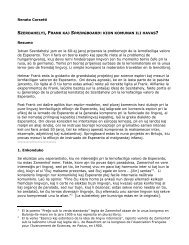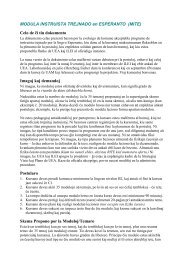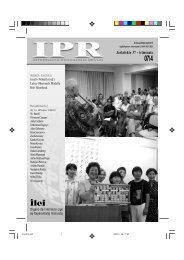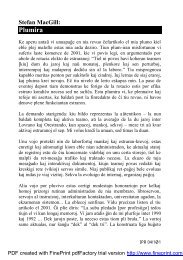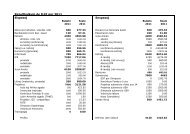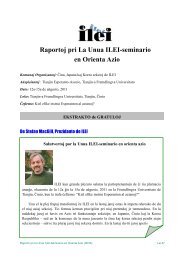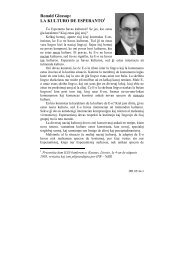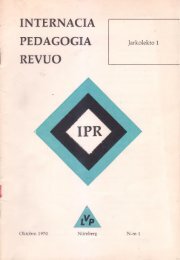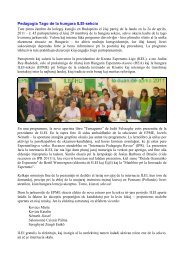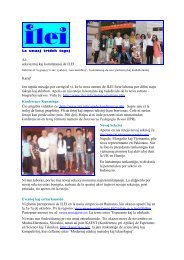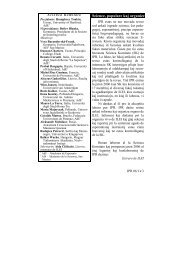Prof. Humphrey Tonkin University of Hartford, USA tonkin ... - ILEI
Prof. Humphrey Tonkin University of Hartford, USA tonkin ... - ILEI
Prof. Humphrey Tonkin University of Hartford, USA tonkin ... - ILEI
Create successful ePaper yourself
Turn your PDF publications into a flip-book with our unique Google optimized e-Paper software.
6<br />
sophisticated in articulating the arguments for learning language. In the space <strong>of</strong> a few years,<br />
the American Council on the Teaching <strong>of</strong> Foreign Languages, the principal pr<strong>of</strong>essional<br />
organization <strong>of</strong> language teachers, has gone from a minimally staffed <strong>of</strong>fice in an outer<br />
suburb <strong>of</strong> New York to a well-organized and politically engaged operation in Washington.<br />
The year 2005 was declared the Year <strong>of</strong> Languages in the United States, and politicians and<br />
business leaders flocked to endorse it, among them President Bush himself. The idea was<br />
copied from similar efforts in Europe, to be sure, but it would have been inconceivable a<br />
few years ago.<br />
There are still segments <strong>of</strong> the population that remain suspicious <strong>of</strong> foreign-language<br />
knowledge (there is little doubt that John Kerry’s fluency in French did him no good in<br />
some sectors during the last presidential election). They perhaps harbor unarticulated<br />
feelings, derived from the notion that nationhood and language are near-allied, that fluency<br />
in other languages compromises national loyalty. They also perhaps believe, in line with my<br />
opening argument, that the use <strong>of</strong> foreign language constitutes a concession to the power <strong>of</strong><br />
foreigners when Americans should “stand tall” by speaking their own language. Such<br />
inhibitions have prevented language from gaining a significant position in educational<br />
legislation in Washington: it is not one <strong>of</strong> the basic skills included in the No Child Left<br />
Behind Act, which has unfortunately distorted educational priorities across the country (or<br />
focused them, depending on one’s point <strong>of</strong> view).<br />
Despite all <strong>of</strong> this, overall enrollment statistics present a remarkably healthy picture.<br />
According to ACTFL statistics, at the secondary level (including high school, i.e. grades 7-<br />
12), in the year 2000 some seven million students (33.8% <strong>of</strong> total enrollment) were engaged<br />
in study <strong>of</strong> foreign languages, up from 32.8% in 1994. At the high school level (the final<br />
four years <strong>of</strong> schooling), the percentage was 43.8%, up from 41.9% at any one time. At the<br />
elementary level (K-6), however, the percentage declined: down from a tiny 6.4% to an even<br />
tinier 5%. Spanish was the dominant language: 68.8% <strong>of</strong> all language enrollments at the<br />
secondary level (7-12) were in Spanish, an increase <strong>of</strong> 3.0% over 1994. French was down<br />
1.3% and German and Latin slightly down. Italian, however, was up by a huge proportion:<br />
38%, though on a small numerical base.<br />
The ACTFL survey <strong>of</strong> elementary and secondary education was incomplete: because <strong>of</strong> the<br />
extreme decentralization <strong>of</strong> the system, collecting solid statistics is very hard, and<br />
comparative numbers over time are even less reliable, because <strong>of</strong> changed collection<br />
methods or criteria. The Modern Language Association, which collects data from the<br />
tertiary, university level, is considerably more reliable because the data are more easily<br />
collected from a smaller and less diversified base. Here we see some encouraging<br />
developments. Tables 1a and 1b, below, show gains for almost all languages between 1998<br />
and 2002, with significant gains for Spanish and with a marked increase for Italian, which is<br />
on its way to catching up with German. Percentage increases among minor languages may<br />
be less significant, but the gains for Arabic are notable, as are the significant increases in<br />
Latin, Greek and Biblical Hebrew. There may be many reasons for these shifts, but a<br />
significant revival <strong>of</strong> language learning at the college level seems to be underway, at least for<br />
some languages. The ACTFL statistics for the early years <strong>of</strong> schooling could suggest that the<br />
gains are essentially cyclical: there are drop-<strong>of</strong>fs at the elementary and lower secondary levels.<br />
But these numbers are open to multiple interpretations.



